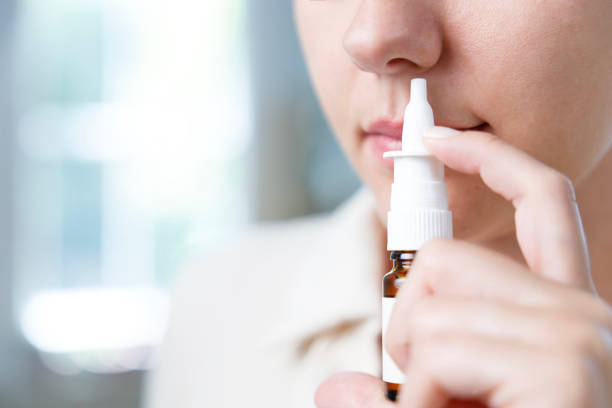USP Nasal Spray Container Closure Integrity Testing
The USP Nasal Spray Container Closure Integrity Test is a critical quality assurance procedure designed to ensure the integrity and sterility of nasal spray containers. This test plays an essential role in preventing contamination, leakage, and compromising the product's efficacy during storage and delivery.
Pharmaceutical manufacturers must adhere to stringent standards set forth by the United States Pharmacopeia (USP) and other regulatory bodies to ensure the safety and effectiveness of their products. The container closure integrity test is a fundamental aspect of this compliance process. It helps in identifying any potential breaches or defects that could lead to product degradation, contamination, or failure.
The testing procedure involves subjecting the nasal spray containers to various stresses such as pressure, vacuum, temperature cycling, and mechanical stress. These tests simulate real-world conditions under which the container may be exposed during manufacturing, distribution, and use. The goal is to ensure that any defects in the container closure are detected early on.
The USP specifies several methods for conducting this test, including volumetric testing, helium leak detection, and dye penetration testing. Each method has its own advantages and limitations depending on the specific requirements of the product being tested. For instance, helium leak testing is highly sensitive and can detect even very small leaks, making it ideal for high-purity products like nasal sprays.
Once the test is completed, detailed reports are generated that document any issues found during the testing process. These reports serve as a critical quality assurance tool, providing insights into the performance of the container closure system and helping to identify areas for improvement.
The importance of this test cannot be overstated. Inadequate container closures can lead to product contamination, compromised efficacy, and ultimately harm to patients. By ensuring that the container closures meet the required standards, pharmaceutical manufacturers can help protect public health and maintain consumer trust in their products.
Pharmaceutical quality managers, compliance officers, R&D engineers, and procurement teams all play crucial roles in ensuring that this test is conducted correctly and consistently across production batches. It is essential for these stakeholders to stay informed about the latest testing methods and standards to ensure continued compliance with regulatory requirements.
The USP Nasal Spray Container Closure Integrity Test is a vital component of any comprehensive quality assurance program. By adhering to rigorous testing protocols, pharmaceutical manufacturers can help ensure the safety and efficacy of their products, thereby protecting public health and maintaining consumer confidence.
Scope and Methodology
The scope of USP Nasal Spray Container Closure Integrity Testing encompasses a comprehensive assessment of the integrity and sterility of nasal spray containers. The primary objective is to ensure that there are no breaches or defects in the container closure system that could compromise the product's quality and safety.
- Preparation: Prior to testing, the nasal sprays must be thoroughly cleaned and prepared according to specified procedures. This may include rinsing with distilled water, drying, and labeling for identification purposes.
- Testing Conditions: The containers are subjected to various stress conditions such as pressure, vacuum, temperature cycling, and mechanical stress. These conditions simulate the real-world environment in which the container may be exposed during manufacturing, distribution, and use.
- Data Collection: During testing, detailed data is collected on any breaches or defects detected. This information is crucial for identifying potential issues and making necessary adjustments to the production process.
The methodology employed in this test is based on international standards such as USP 2019 and ISO 11607-7. These standards provide clear guidelines for conducting the test, ensuring that it is performed consistently across different laboratories.
The use of advanced instrumentation such as helium leak detectors and dye penetration testers ensures accurate and reliable results. These instruments are calibrated regularly to ensure their accuracy and reliability, further enhancing the quality of the testing process.
International Acceptance and Recognition
- USP Compliance: The USP Nasal Spray Container Closure Integrity Test is widely recognized and accepted by regulatory bodies around the world. It is a key requirement for ensuring product quality and safety, and compliance with this test is often a prerequisite for product approval.
- ISO Standards: Many laboratories also adhere to ISO standards such as ISO 11607-7, which provide additional guidelines for conducting container closure integrity tests. These standards are recognized globally and help ensure consistent testing practices across different regions.
The USP Nasal Spray Container Closure Integrity Test is a critical component of the pharmaceutical industry's quality assurance program. Its widespread acceptance by regulatory bodies ensures that products meet stringent safety and efficacy standards, thereby protecting public health.
Environmental and Sustainability Contributions
- Eco-Friendly Materials: The use of eco-friendly materials in nasal spray containers can help reduce environmental impact. By selecting sustainable packaging solutions, pharmaceutical manufacturers can minimize their carbon footprint.
- Energy Efficiency: Advanced testing equipment used in this process is often designed to be energy-efficient, reducing overall operational costs and minimizing waste.
The USP Nasal Spray Container Closure Integrity Test plays a vital role in ensuring the quality and safety of nasal sprays. By adhering to rigorous testing protocols, pharmaceutical manufacturers can help protect public health while also contributing positively to environmental sustainability.





